The capture of Amsterdam has finally seen the Roman war machine grind to a halt now that there largest enemy is dead and under the rule of Romans themselves. There is some violence and hatred towards Amsterdam, as to be expected from a long siege in which both sides lost friends and family members to the other side, but other than that, it is relatively peaceful in the former Dutch capital. Not so peaceful though, is the fact that multiple Dutch nobles, commanders, and members of the royal family of the late Dutch king, are being hauled to courts in Roma to stand trial for their accused crimes against the Roman people and not surrendering the city when all had seem lost a full six months before the final, sweeping offensive dislodged the rest of the garrison stationed in the city. Since they did not surrender the city, and continued to fight on against the Roman legions, more than three hundred thousand additional lives were lost in the taking of the city.
Needless to say, the trial is one full of heated debate. Dozens of people will walk free, yet hundreds more will be hung in the grand Roman harbor in Roma itself as a show of force to all that deny the Roman Empire it's need for conquest, quick conquest at that.
Since this has taken a rather bad turn of events, a complete restructuring of the military is under way. With the mostly plebian controlled Senate leading the charge, investigations into the military fiascoes that plagued the Roman forces are underway to try and find the root cause of this sort of atrocity. It is during this time that the plot to assassinate Emperor Maximus IX of Roma was discovered, which was followed by more arrests and trials that stretched on for nearly two years. Many more will hang by the noose than will walk free from the trials, which is seen as a just reward for the people who managed to kill many Roman soldiers through their crass disregard of human life in general.
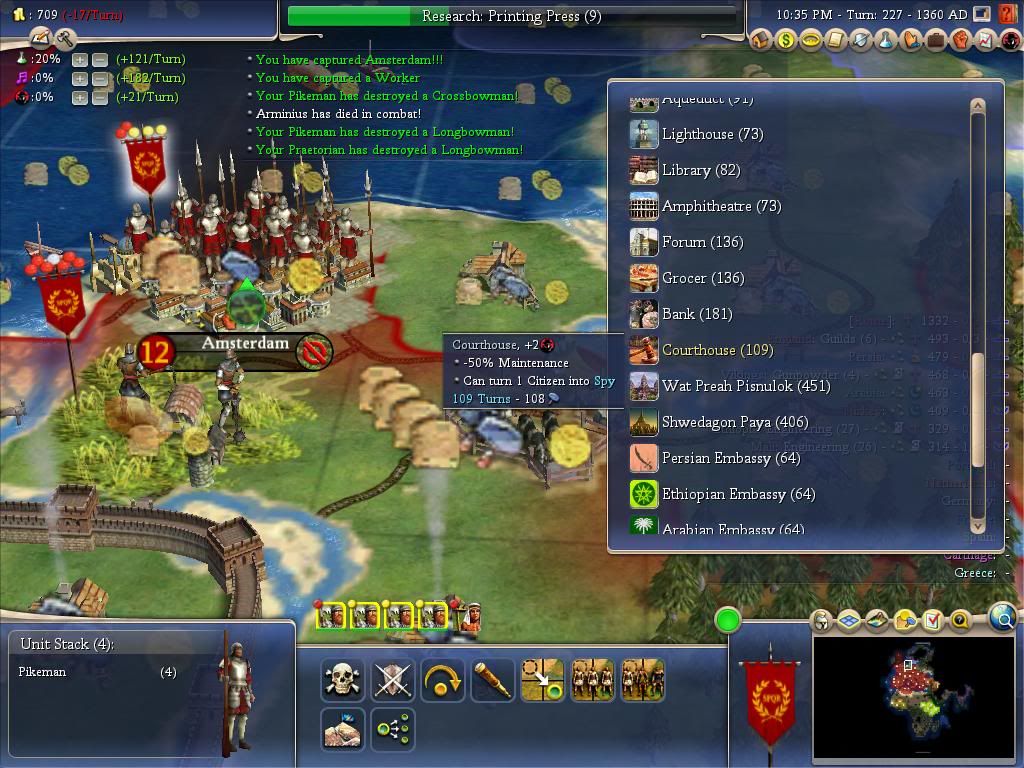
With the war now over, a Roman garrison takes up residence inside of Amsterdam and is put to work rebuilding the city, clearing out rubble, and cleaning up the mess that was made of the settlement. During this time, many Roman soldiers take Dutch wives, and vice versa as well. The Dutch gradually begin to lose their hatred and fear of Romans and start to host and enjoy the company of the Roman soldiers that are located in their city. Likewise, many Romans move into Amsterdam and take up residence while a bustling community is created that is very much a part of the fabric of the city. This new and bustling sector of the Roman empire is growing to be the most prosperous one as well, a fine example of Roman virtue and honor.
Emperor Tiberius II passes away soon after the rebuilding of Amsterdam is completed, complications arising from a chest infection. His son, Tiberius III, takes office and leads the nation for the next sixty years of Roman history, shown here in just a little bit.
The Roman treasury is suffering some rather heavy losses from war time and heavy research by Roman scientists that takes up a large portion of the commerce available to the nation. The stability of the Empire is normal, relatively unchanged, though the recent expansion into Amsterdam has some people worried about what could happened as many of those people lose some faith in the Roman Empire's way of conquest and capturing enemy cities. The civic structuring of the Empire also seems to clash and cause the stability of the Empire to fall. The Status Quo at the moment is too good pass up, and has kept the Empire together for the past two hundred years or so.
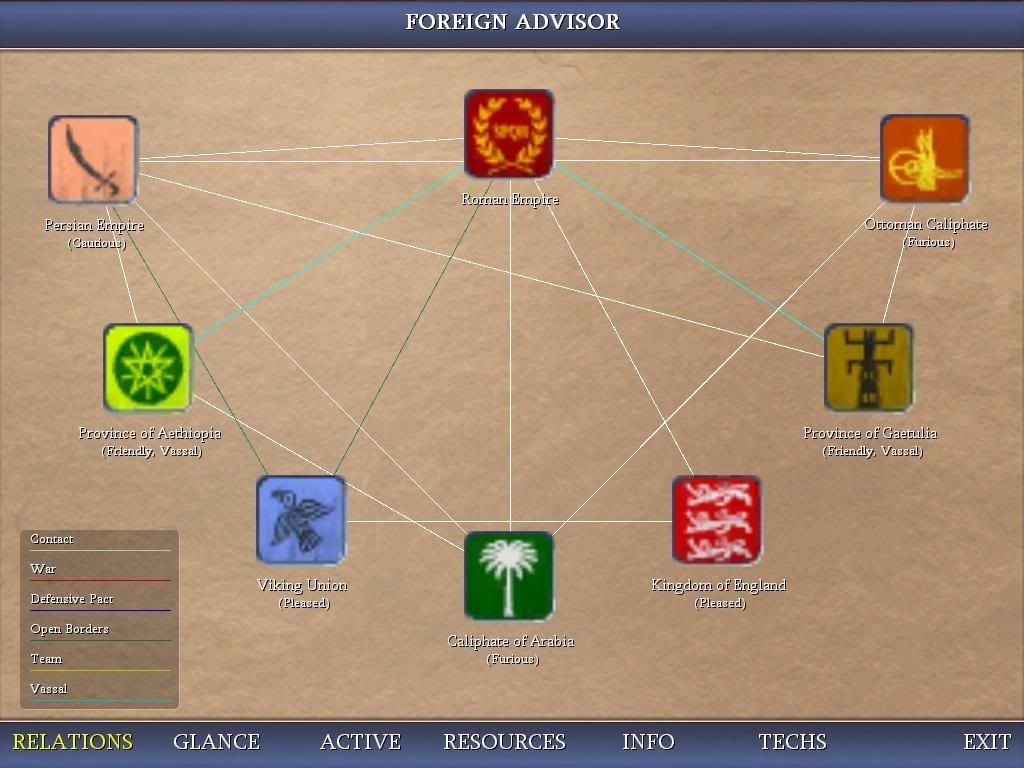
Of the known civilizations in the world, these civilizations are listed with the diplomatic and international agreements that were set forth by each nation. Peace reigns at the moment, and the Roman Empire is especially peaceful as well as the Malinese province of Gaetulia, and the Ethiopian Province as well. Large amounts of trade goods flow thick and fast between the trio of nations, as well as hefty amounts of cash.
The merchant caravan makes it's way deep into Persian territory, hoping to make a healthy profit for the Roman government back at home. They have already wandered through Arabia and down where Egypt used to be, and now they head east, to the lands of Persian and Babylon long fallen into ash and dust, to far flung countries such as India and China. The hope is that the valuable tea, spices, pepper, and silks located in these far away countries can be acquired through peaceful negotiation without having to go to the flaming sword of fury.
With new contact with the Persians and their leader, Darius XXIV, Rome decides to open up it's borders and trade directly with the Persians in an effort to increase the amount of wealth flowing into the coffers of the Empire, as well as valuable resources and tributary payments as well. It is agreed between the councilors of the Empire and the Emperor himself to open the borders so that all may profit on the wealth and trade of the Persians.
The Persians agree to the deal, and trade opens up between the two nations openly. The overland routes are safe through Rome and in Persia, but in Anatolia, it is a rather different. Many traders prefer the sea route around the Cape of Marius around the southern tip of Africa.
Roman-German Engineer Wilhelm Schickard finishes up his assorted training and offers his services and his work to the Roman government.
Schickard is sent to Athenai to finish up the construction of the grand Spiral Minaret.
After fulfilling his task, Schickard is killed by a street gang. His body is buried next to the Grand Minaret, and the Grand Minaret has his name commemorated on it's stones.
Construction of a grocer and a merchant's quarter within the city of Athens begins to try and expand trade on the bountiful Aegean sea.
A courthouse to deal with more bandits and criminals in the conquered Iberian Peninsula are underway in order to not have to truck all of the petty criminals back to Roma for trial and sentencing. This cuts down on the amount of escapees and random convicts wandering the territory of the western provinces of the Empire.
Passing into India, the merchant caravan is entertained and housed by the Raj of India, a jolly Hindu man who is quite a good person. Emperor Tiberius III sends his own son, Tiberius IV, to meet with the Raj and discuss business and trade.
The Khmer ambassadors meet the caravan and are directed back to Roma to meet with the Emperor himself. The Khmer are apparently vastly vexed and annoyed with the Romans for following the so called heathen religion of Christianity, though the Buddhist faith that the Khmer follow is strange and alien to the Christians and Jews and the Muslims of the Roman Empire.
The caravan forges on to Dhaka in order to explore and try to give new maps back to the Roman capital about the areas east of India. The caravan though finds no buyers of their goods or products that are so loved by the Romans.
The merchant caravan turns back into India to see if the Raj and his court will buy the goods for a higher price than they had asked for previously. This will hopefully stimulate the Roman economy.
The multiple Muslim wandering trade areas and free cities in Anatolia unify to form the Turkish Sultanate. The Sultanate has unknown intentions and unknown goals, and only time will tell if they are friendly... or not.
 !
! .
. .
.




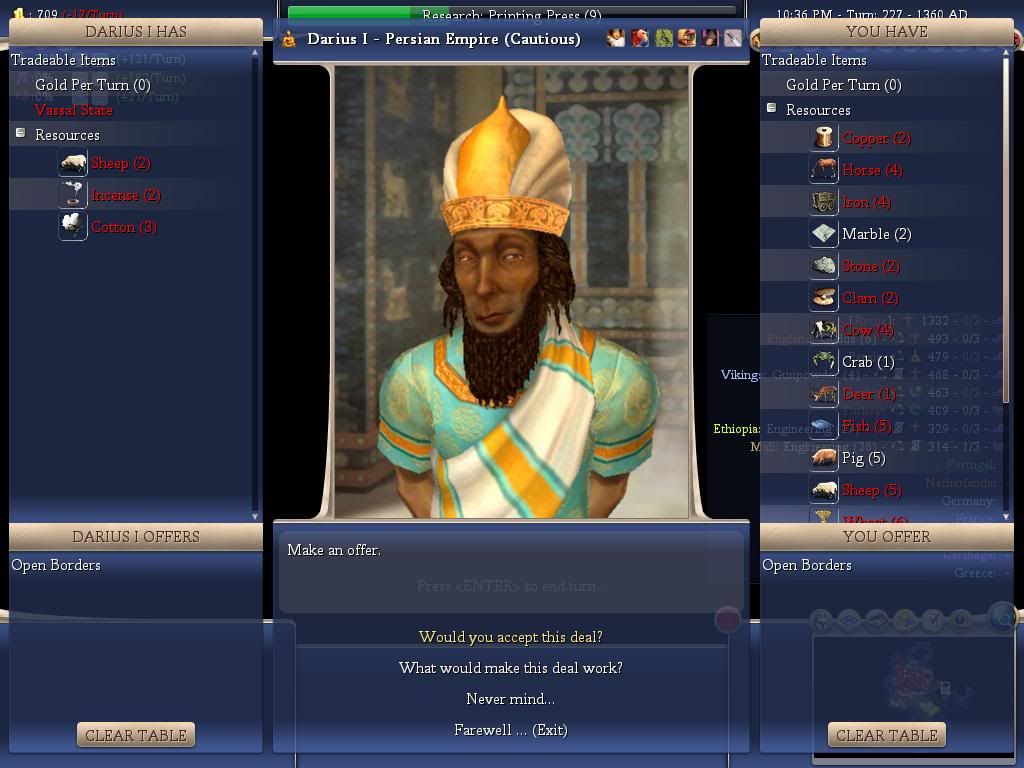
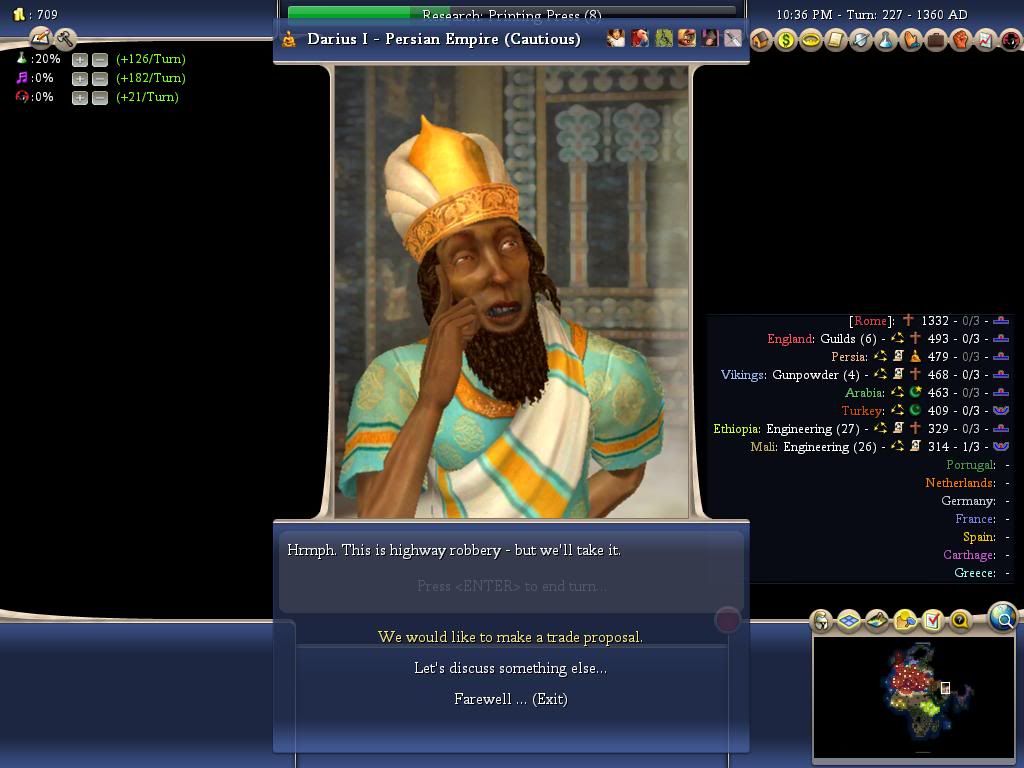


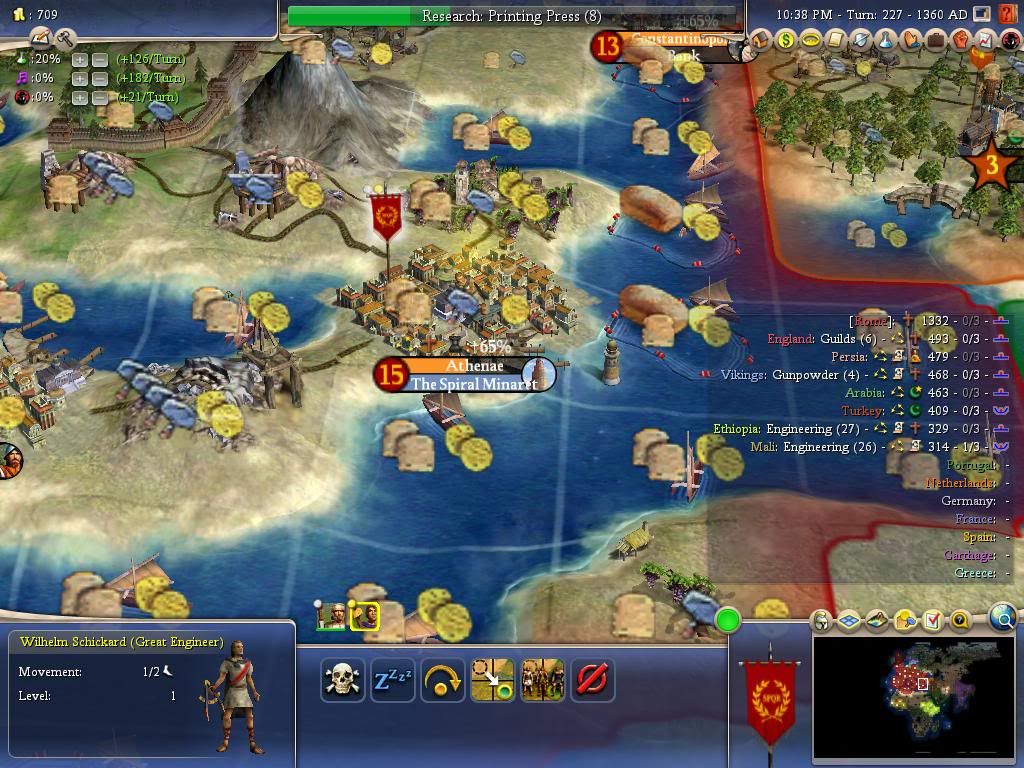
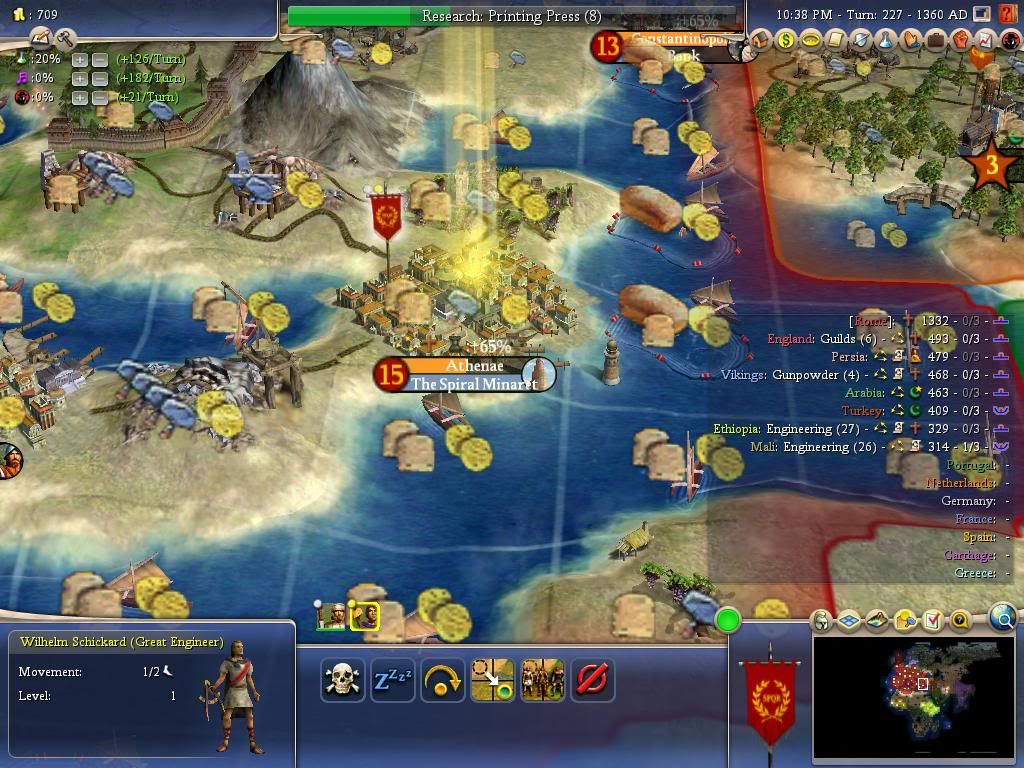
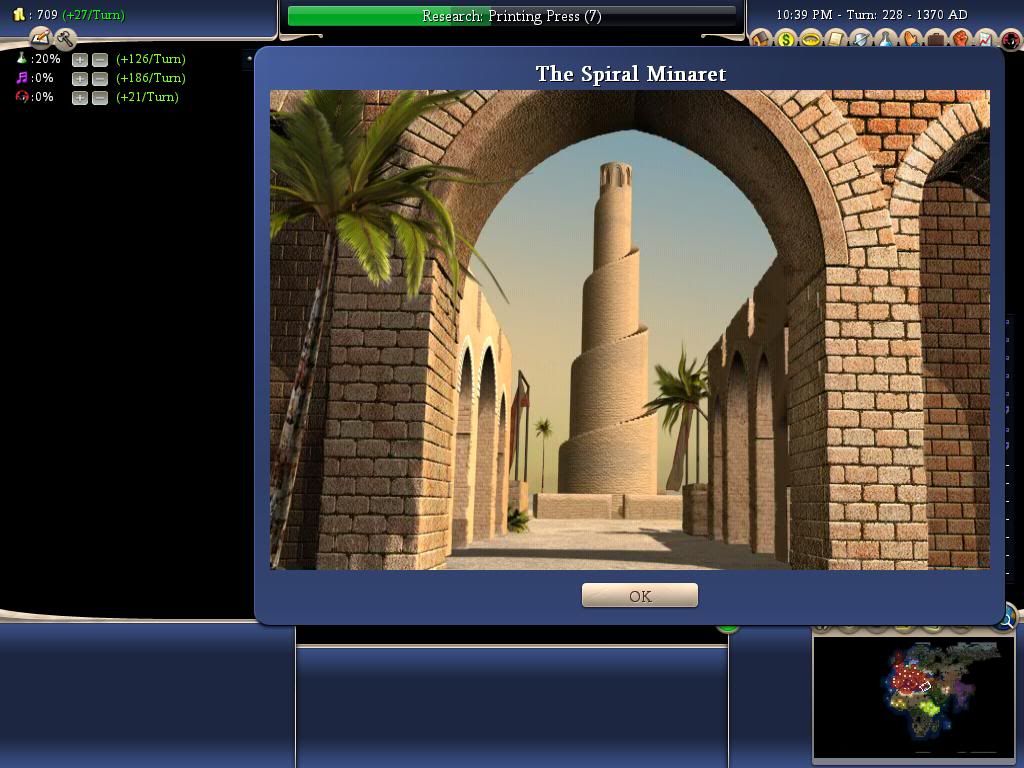


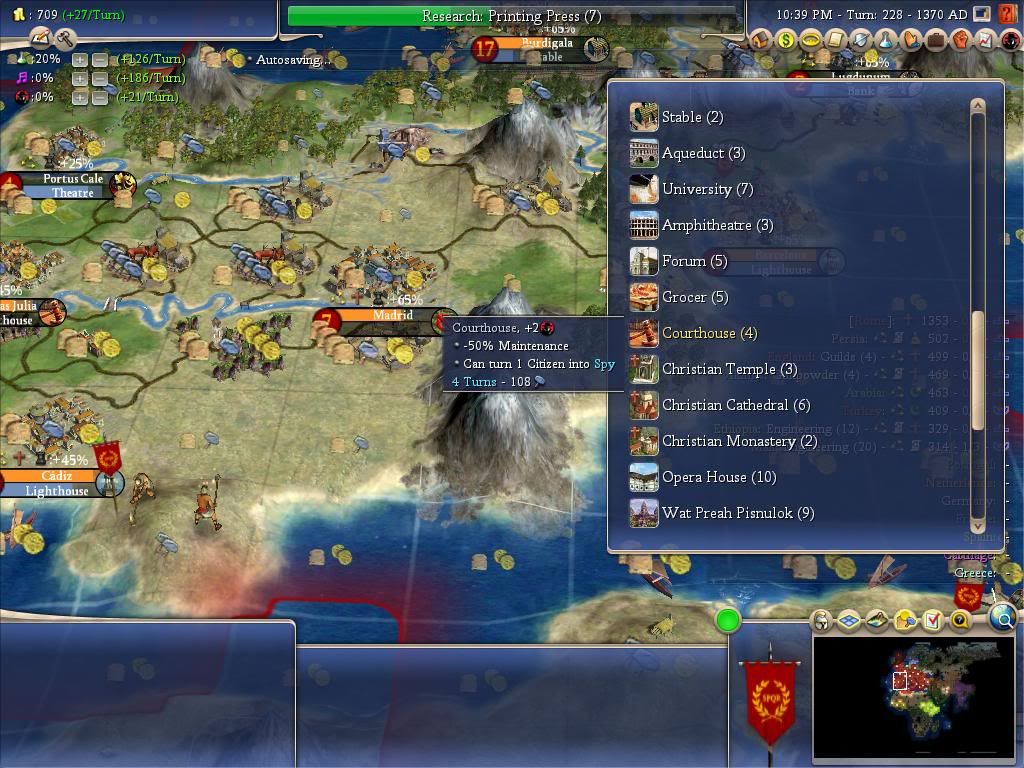
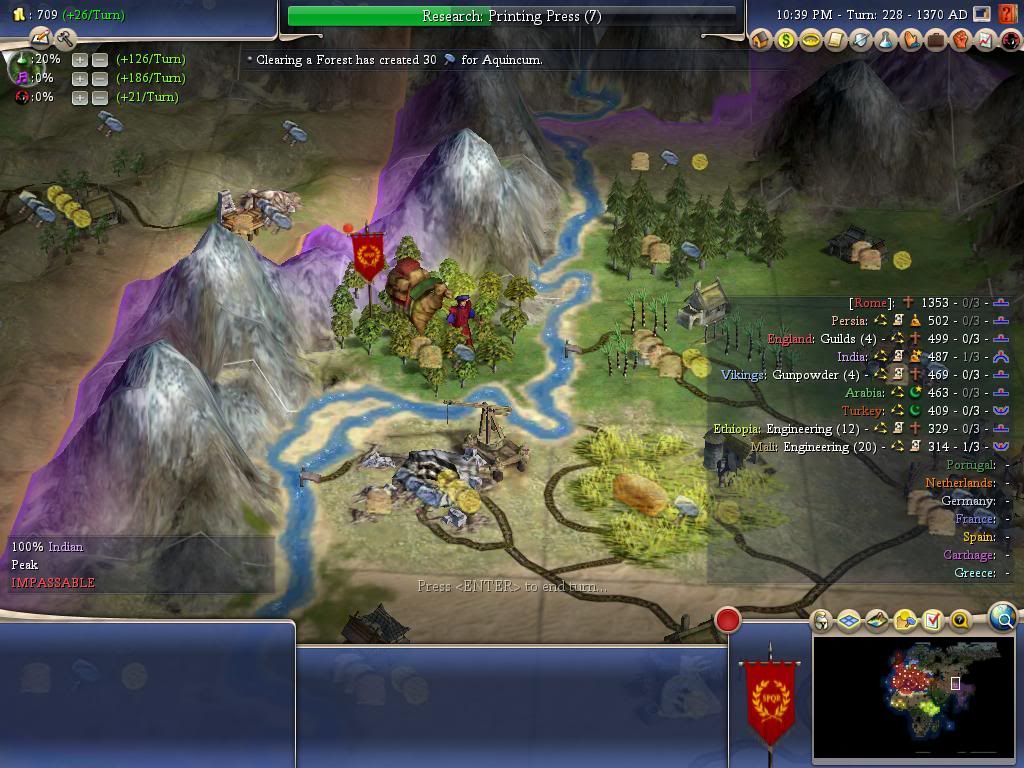





 .
.